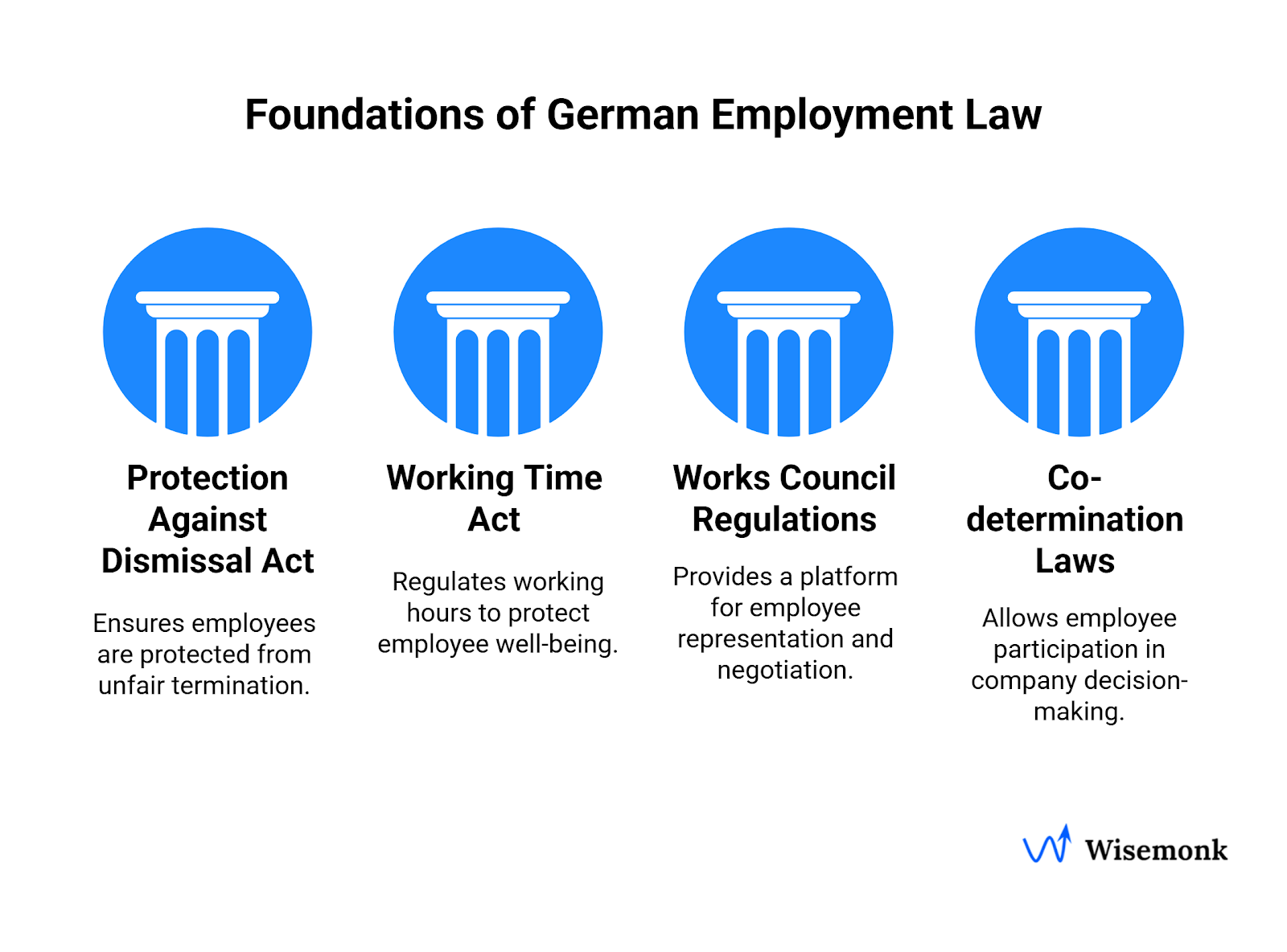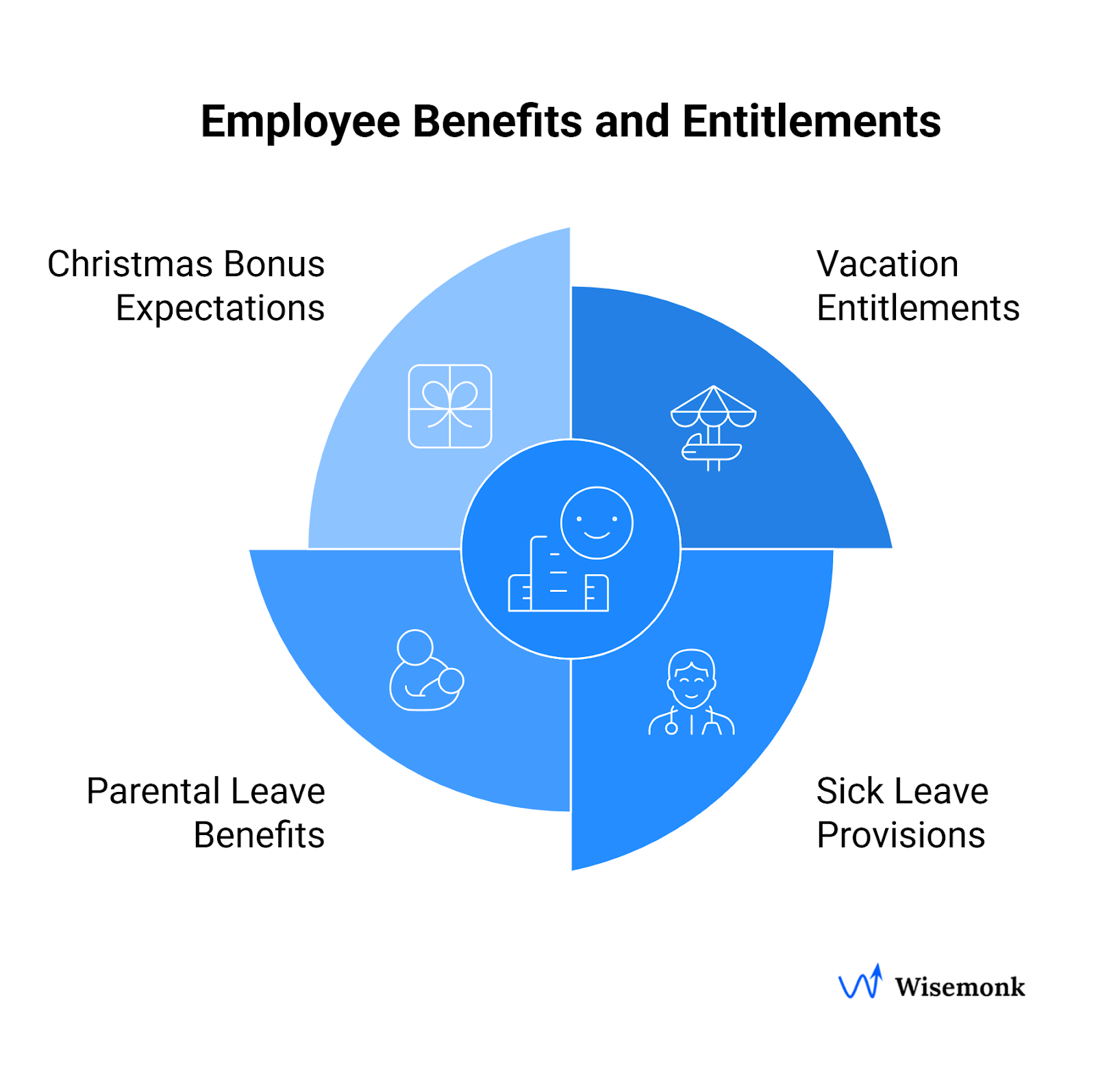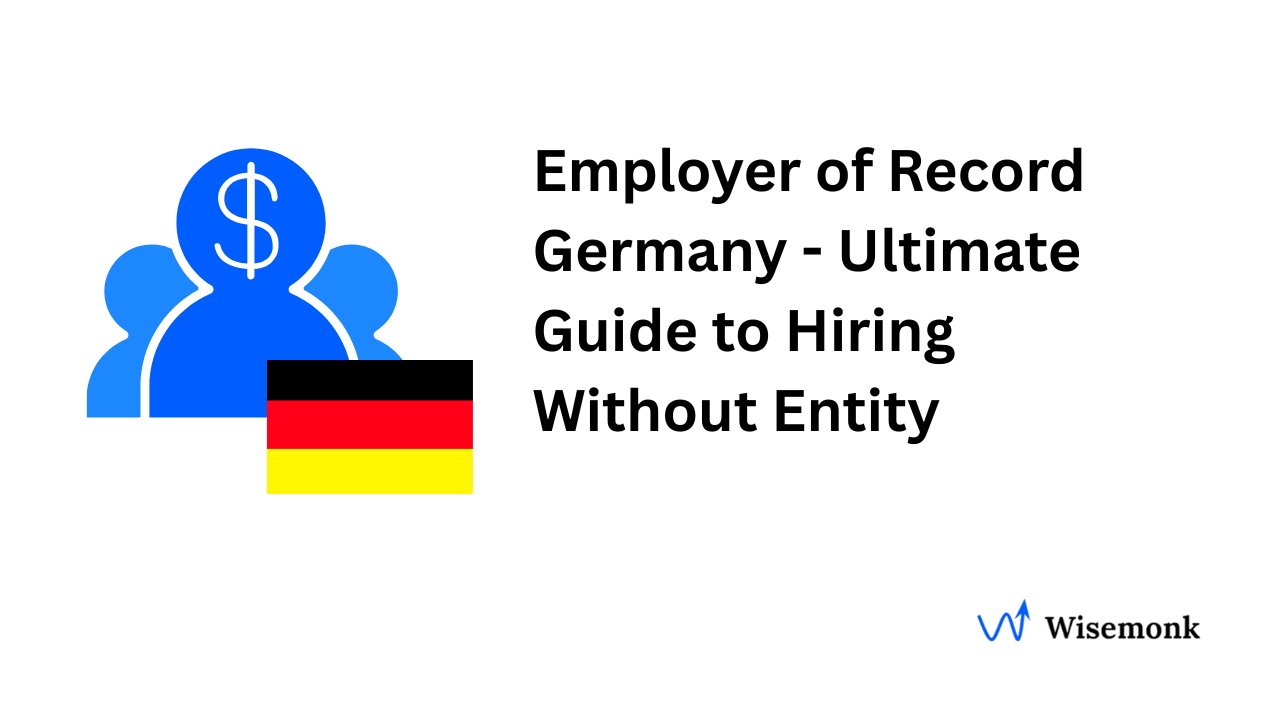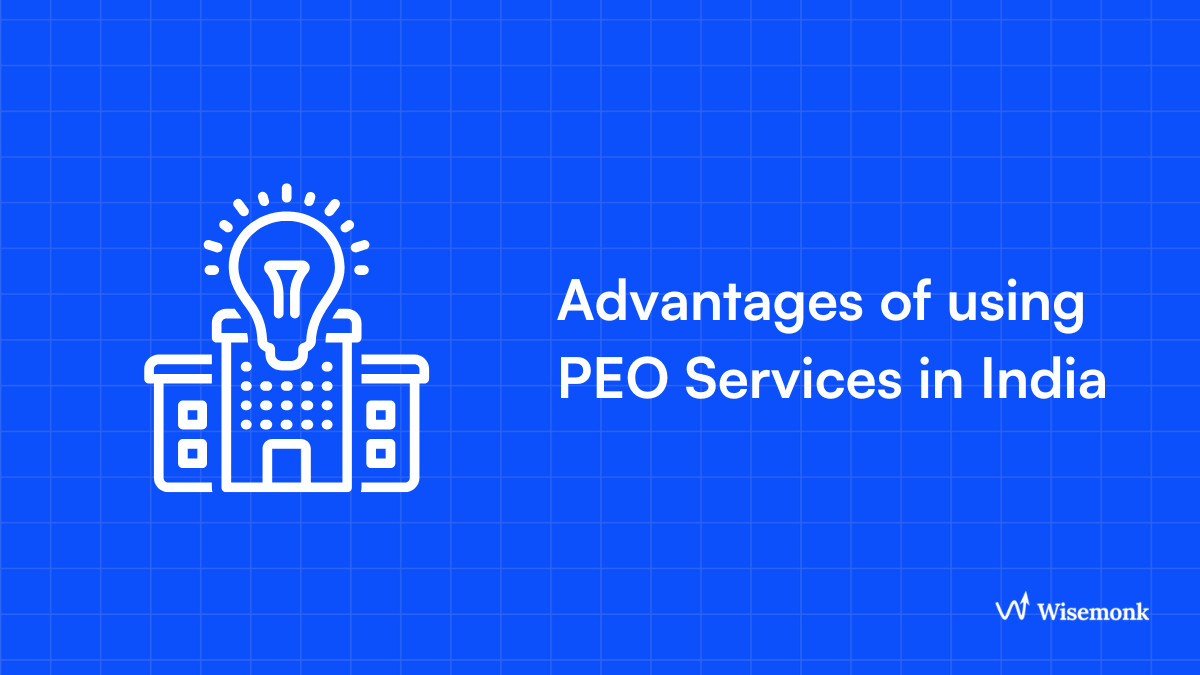Looking to expand your team in Germany? Its strong economy and skilled workforce are attractive, but German employment laws, payroll taxes, and complex contracts make hiring tricky. An Employer of Record Germany acts as your local legal employer, managing payroll, social security, and compliance, so you can quickly hire German employees without setting up a local entity and focus on growing your business.
What Is the German Employment Law Framework?[toc=Employment Law Framework]
Hiring employees in Germany comes with a unique set of local labor laws designed to protect workers and ensure fair employment conditions. Understanding these regulations is crucial for any company expanding into Germany, especially for those using an Employer Of Record Germany.

- Protection Against Dismissal Act (KSchG): This law safeguards employees from unfair dismissal. It applies to companies with more than ten employees and requires that terminations are justified and follow strict procedures.
- Working Time Act (ArbZG): Regulates working hours, overtime, rest periods, and maximum weekly work limits for German employees. Standard full time employees cannot work more than 48 hours per week, with specific rules for rest and overtime pay.
- Works Council Regulations: German labor laws grant employees the right to form a Works Council (Betriebsrat) in companies with at least five employees. The Works Council plays a key role in collective bargaining agreements, workplace policies, and employee representation.
- Co-determination Laws: Co-determination (Mitbestimmung) requires employee participation in certain company decisions, especially in larger companies. This affects board composition, management practices, and internal communication with employees employed under German law.
What Are the Key Benefits of Using an Employer of Record Germany?[toc=Key Benefits of EOR]
Expanding into Germany’s robust market can be daunting, but using an Employer of Record in Germany simplifies the process while offering tangible advantages:
- No Need for a Local Legal Entity:
Hire employees and run payroll without the time and expense of forming a German company. - Compliance with German Employment Laws:
The EOR manages all aspects of labor law compliance, including payroll taxes, social security contributions, minimum wage, and collective bargaining agreements. - Fast Access to Skilled Talent:
Tap into Germany’s highly qualified workforce quickly, with streamlined onboarding and legal employment contracts. - Reduced Administrative Burden:
EOR services handle all local payroll, benefits administration, and regulatory filings, letting your team focus on growth, not bureaucracy. - Gateway to the EU Market:
Germany serves as a central entry point for further EU expansion, and an EOR helps manage the complexities of cross-border employment for international companies.
With these benefits, an Employer of Record in Germany offers a safer, more agile, and cost-effective path for companies seeking rapid and compliant growth in Europe.
How Does Employer of Record Germany Handle Payroll and Tax Compliance?[toc=Payroll & Tax Compliance]
An Employer of Record Germany manages all aspects of payroll and tax compliance to ensure your business meets German legal requirements. Here’s what they handle according to the key points in the outline:
- Income Tax & Lohnsteuer: Employers withhold income tax (Lohnsteuer) directly from employee salaries, including solidarity surcharge and, if applicable, church tax. Deductions are based on progressive tax classes set by German law. See current rates: Federal Ministry of Finance.
- Social Security Contributions: Employer of Record (EOR) Germany registers employees and manages both employer and employee contributions for health insurance, pension, unemployment, and long-term care insurance. Rates are set annually and typically shared equally. Details on legal obligations can be found at German Statutory Pension Insurance Scheme.
- Church Tax: Church tax (Kirchensteuer), usually 8% or 9% of income tax, is withheld if employees belong to certain religious communities, varying by federal state. The EOR determines eligibility and handles remittance. See more at Church Tax information, BZSt.
- Monthly and Annual Filings: EORs file all payroll tax declarations electronically each month and submit annual reports to the local tax office (Finanzamt) and social agencies, ensuring compliance and accurate, on-time payments.
These processes ensure your company meets all German tax, social security, and reporting obligations efficiently, while your employees receive the full statutory protections and benefits.
What Employee Benefits and Entitlements Are Managed for Employees in Germany?[toc=Employee Benefits & Entitlements]
An employer of record Germany ensures your team receives all benefits required by German labor laws, keeping your company compliant and your employees engaged. Here’s what’s covered:

- Vacation Entitlements: Employees are legally entitled to at least 20 days of paid vacation per year for a five-day workweek. Many employers offer even more days as part of competitive benefits packages. For statutory minimums, see Federal Holiday Act (Bundesurlaubsgesetz).
- Sick Leave Provisions: If an employee is ill, they have the right to up to six weeks of continued pay from the employer with a doctor’s note. After six weeks, statutory health insurance covers sick pay.
- Parental Leave Benefits: Employees can take up to three years of unpaid parental leave, with job protection and options for part-time work. Parental allowance is available through the government to support families during this time.
- Christmas Bonus: While not legally required, Christmas bonuses (“Weihnachtsgeld”) are common and often expected by German employees. These are typically outlined in employment contracts or collective bargaining agreements.
By managing all statutory benefits, vacation, sick pay, parental leave, and expected bonuses, EOR services Germany help you build attractive employment contracts, foster employee satisfaction, and ensure compliance with German employment law.
What Does the Hiring and Onboarding Process Look Like with Employer of Record Germany?[toc=Hiring & Onboarding Process]
Hiring through an Employer of Record in Germany involves clear, compliant steps to get your team ready quickly:
- Required Documentation: Employees need valid ID, tax ID (Steueridentifikationsnummer), and social security registration.
- Background Verification: Basic checks on employment history and qualifications ensure suitability.
- Contract Requirements: EORs prepare compliant employment contracts in line with German labor laws, covering salary, working hours, and benefits.
- Integration Timeline: Onboarding typically takes 1 to 3 weeks, including registrations with tax and social security authorities.
This structured process helps foreign companies hire German employees efficiently while maintaining full legal compliance.
How Do You Manage the German Workforce?[toc=Workforce Management]
Building an effective team in Germany isn’t just about following the rules; understanding the culture is key too. Here’s how working with an Employer of Record in Germany makes the process smoother and more enjoyable for everyone involved:
- German Work Culture: You’ll notice that punctuality is a big deal, and meetings usually run like clockwork. Respect for hierarchy is important; people expect clear structure.
- Communication Styles: Germans appreciate direct and honest feedback, but also value professionalism. Regular, constructive conversations help build trust and keep teams motivated.
- Performance Management: Ongoing evaluations and professional growth are part of the norm. An EOR can help you set up regular check-ins and development plans so your employees always feel supported.
- Professional Development: Encouraging learning and upskilling goes a long way! Employees in Germany thrive with access to ongoing training and new challenges at work.
- Works Council and Co-Determination: If your team is big enough, they may set up a Works Council. This group gives employees a say in key decisions, so including them from the start means smooth sailing for everyone.
How Do Works Council and Co-Determination Shape Hiring in Germany?[toc=Works Council & Co-Determination]
When hiring in Germany, employee participation in business decisions is a big deal. Here’s what you need to know:
- Works Council Establishment:
If your workplace has at least five employees, they can form a Works Council (Betriebsrat) which represents their interests on workplace issues. - Co-Determination Requirements:
Co-determination laws require employee involvement in major business decisions, especially in larger companies. - Employee Participation Rights:
Works Councils have rights to consultation, information, and in some cases, veto power over policies affecting staff. - Compliance Strategies:
An employer of record Germany guides you in working transparently with Works Councils and following all co-determination rules, avoiding legal complications while keeping employees engaged.
What Are the Termination Procedures in Germany?[toc=Termination Procedures]
Terminating employment in Germany involves strict legal protections and clear steps:
- Dismissal Protection Laws:
Employees in companies with more than ten staff are protected by the Protection Against Dismissal Act (KSchG), which requires valid reasons for termination. - Notice Periods and Severance:
Notice periods vary by length of service, usually starting at four weeks. Severance pay may be required, especially in redundancy cases. - Social Selection Criteria:
When layoffs occur, employers must consider social factors like age, tenure, family status, and disability. - Risk Mitigation:
Working with local experts or an EOR helps ensure all legal obligations are met, minimizing costly disputes and penalties.
These procedures ensure fairness while protecting both employee and employer rights under German labor law.
How Should You Approach Cost Analysis and Financial Planning When Hiring in Germany?[toc=Cost Analysis & Financial Planning]
Planning your budget for hiring in Germany involves understanding more than just salaries. Here’s how international companies can make smart financial decisions:
- EOR Service Pricing Models: Employer of record (EOR) providers in Germany typically charge a clear, per-employee monthly fee. This covers payroll processing, employee leasing compliance, tax filings, and HR administration, making your costs predictable and transparent.
- Social Security Cost Implications: Both employers and employees must contribute to Germany’s statutory social security system, including health, pension, unemployment, and long-term care insurance. These contributions, set by German law, can make up a significant part of total employment costs and are split roughly 50:50.
- Benefits Budgeting: Plan for required statutory benefits such as vacation, sick pay, and parental leave, plus allowances for expected extras like Christmas or holiday pay. EOR services Germany manage these entitlements, so you can forecast expenses accurately.
- ROI Calculations: Using an EOR lets you avoid the costs and risks of setting up a local entity, speed up hiring, reduce admin overhead, and maintain full compliance. Companies often see direct savings on legal, payroll, and HR management costs.
With the right EOR partner, you’ll understand and control all costs upfront, making financial planning for your German expansion simple and reliable.
What are the Common Challenges and Solutions When Hiring in Germany?[toc=Challenges]
Hiring in Germany comes with challenges, but there are clear solutions to navigate them.
- Complex Dismissals: Germany’s strict dismissal laws mean clear documentation and legal timelines are essential; working with an EOR or local experts reduces risks.
- Works Council: Teams of five or more can form a Works Council, requiring proper consultation before workplace changes; an EOR helps manage this smoothly.
- Cultural Integration: Direct communication and respect for hierarchy are key; onboarding support and local HR expertise ease cultural differences.
- Scaling: Regional variations in collective agreements and benefits require flexible compliance; EOR services provide this adaptability.
With expert EOR support, companies can navigate these hurdles and grow efficiently in the German market.
Key Takeaways[toc=Takeaways]
Using an Employer of Record streamlines hiring by handling compliance, payroll, and employee benefits without the need to set up a local entity, significantly reducing setup time, costs, and legal risks for fast, flexible expansion. Businesses planning to expand should clearly assess their hiring needs and timelines, research reputable EOR providers with proven expertise, and evaluate their technology and pricing to find the best fit.
Here are a few action items for implementation:
- Define the size and key roles of your German workforce.
- Request and compare proposals from multiple EOR providers focusing on compliance and service offerings.
- Plan employee onboarding and technology integration with your selected EOR platform.
- Monitor updates to German local employment laws to ensure ongoing compliance.
Following these steps will enable companies to enter the German market quickly, efficiently, and with confidence.
Ready to expand your UK workforce quickly and compliantly? Partner with Wisemonk’s Employer of Record services to effortlessly manage hiring, payroll, and compliance, so you can focus on growing your business with confidence.
Frequently asked questions
What is the German Works Council and when is it required?
A Works Council represents employee interests and is required in companies with five or more employees.
How does the dismissal protection law work?
It protects employees in companies with more than ten staff, requiring valid reasons and proper notice for termination.
What are the social security contributions in Germany?
Both employer and employee contribute roughly equally to health, pension, unemployment, and long-term care insurance.
How long does it take to hire through EOR in Germany?
The hiring process typically takes 1 to 3 weeks, including contract preparation and registration.
What are the co-determination requirements?
Employees must participate in company decisions through Works Councils and, in larger firms, have board representation.
What is the 18-month limit for EOR in Germany?
In Germany, an employee can be assigned to the same company for a maximum of 18 consecutive months. After this, the arrangement must end or pause for at least 3 months before reassigning to the same client.
What happens if I stay out of Germany for more than 6 months?
Your residence permit expires after 6 months abroad. The EU Blue Card becomes invalid after 12 months, and family members’ permits follow the same rules.


.png)
